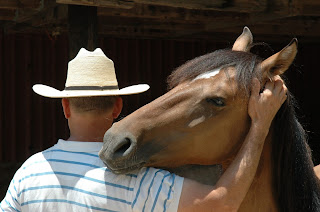A Handful of the Obscure
 Whilst I was trying to force an alert state this morning over my second cup of tea, I abandoned playing Zuma Deluxe (reflexes just not fast enough yet), and resorted to something a bit less stressful, my newest obsession, Firefox Stumbling, whereupon I came to the web page with lists for the top science fiction stories, books, movies and television shows, according to the website’s visitors’ votes. Perusing these lists reminded me of pleasures long past that stay with me even now, some of them so obscure as to be relatively unknown. Granted, some of these books / movies / TV shows / stories are obscure because they are bad; I will admit that. But some are obscure because they are too serious, too upsetting, or somehow outside that Hollywood ‘blockbuster’ mould of happily-ever-after, moralising, all-American wholesomeness that seems to do so well with the movie-viewing public. I began a list of books and movies that did not appear on these lists or that appeared so far down as to have garnered only two or three votes. Today, I would like to share with you my thoughts on six science fiction (or at least speculative fiction) movies that I would watch again. If you have not seen them, perhaps you will take a chance and give them a try. If you are currently residing in Australia and do not subscribe to Fox TV and therefore have turned off the telly because there is nothing anyone with the intellect of a learning disabled chimp (or better) would watch, you don’t have anything to lose by hiring a DVD. None of these are ‘new’ movies, so they’ll be cheap.
Whilst I was trying to force an alert state this morning over my second cup of tea, I abandoned playing Zuma Deluxe (reflexes just not fast enough yet), and resorted to something a bit less stressful, my newest obsession, Firefox Stumbling, whereupon I came to the web page with lists for the top science fiction stories, books, movies and television shows, according to the website’s visitors’ votes. Perusing these lists reminded me of pleasures long past that stay with me even now, some of them so obscure as to be relatively unknown. Granted, some of these books / movies / TV shows / stories are obscure because they are bad; I will admit that. But some are obscure because they are too serious, too upsetting, or somehow outside that Hollywood ‘blockbuster’ mould of happily-ever-after, moralising, all-American wholesomeness that seems to do so well with the movie-viewing public. I began a list of books and movies that did not appear on these lists or that appeared so far down as to have garnered only two or three votes. Today, I would like to share with you my thoughts on six science fiction (or at least speculative fiction) movies that I would watch again. If you have not seen them, perhaps you will take a chance and give them a try. If you are currently residing in Australia and do not subscribe to Fox TV and therefore have turned off the telly because there is nothing anyone with the intellect of a learning disabled chimp (or better) would watch, you don’t have anything to lose by hiring a DVD. None of these are ‘new’ movies, so they’ll be cheap.The first movie that came to mind was the Ken Russell-directed Altered States (1980), based on the Paddy Cheyefsky novel of the same name, which was partly based on dolphin scientist John Lilly’s experiments with immersion tanks. Cheyefsky had serious disagreements with Russell about the screen-adaptation and eventually ‘disowned’ the film. But William Hurt, in his screen debut, does a fine job as does his co-star Blair Brown. It is also Drew Barrymore’s screen debut, but she has a small part. It is a frenetic movie, taking Lilly’s experiments and adding the twist of hallucinogenic drugs to the mix. Everyone talks very earnestly and all at once, and this with the special effects of Hurt’s character’s ‘trips’ in the immersion tank result in a film that Roger Ebert calls “superbly silly’. It is a difficult movie to pigeon-hole into a specific genre, but I still maintain it is worth a look in spite of Cheyefsky’s distaste for it.
Next up (these are in no apparent order – just the order in which I thought of them) is The Man Who Fell to Earth (1976), starring David Bowie and directed by Nicolas Roeg. The screenplay is adapted from a Walter Tevis (The Hustler and The Color of Money) novel, and Bowie plays a humanoid alien who comes to earth to get water for his dying planet. But he is distracted by Earth’s excesses which keep him here far too long to be of any help to his planet. David Bowie, who in his many incarnations often seemed like an alien, portrays the character very well. Again, this is not a movie that everyone will like. It is not a movie one would pop popcorn for and invite a bunch of friends over. But if you want to have a think, consider this film, which Keith Phillips calls ‘a haunting mess’ that is ‘subplot rich’.
In the late-1990s, screenwriter Bruce Joel Rubin visited a US university where I worked as both a lecturer and an administrator, so I had the chance to meet with him for a brief chat. He seemed to me, at the time, more like a person who would write the screenplay Jacob’s Ladder (1990) than the Demi Moore / Patrick Swayze flick Ghost (also 1990). Jacob’s Ladder was actually written in the 1970s, but it took Rubin about 15 years to convince anyone to take it on. Director Adrian Lyne finally did, and there might have been better directors for such a powerful story, but that’s Hollywood for you. And the resulting movie does not disappoint. Tim Robbins plays a Vietnam vet haunted by a traumatic event in the Mekong Delta and the death of his son (Macaulay Culkin’s uncredited screen debut). Elisabeth Peña plays his partner, and Danny Aiello plays his ‘angelic’ chiropractor very well – which makes you almost want to forgive him for his part in Hudson Hawk. All the special effects are live. Give it a try when you want to scare yourself.
My sons have always had very strange tastes in movies. Jeremy and I used to make it a point to go to ‘B’ movies – bad B-movies. We specialised in Jean-Claude Van Damme movies. I won’t be recommending any of those here. John became enamoured of Ralph Bakshi’s Lord of the Rings (1978), so much so that when the cat had kittens, he named all of them after Hobbits. So when they stumbled across Bakshi’s Wizards (1977) in the video store, we had to take it home to watch it. It feels a lot like his incomplete LOR attempt, but this is much more ‘homemade’, partly because several different artists worked on the animation. But it still remains an enchanting parable and ought to be seen by at least animation aficionados. The female characters, true to Bakshi form, all have large breasts, etc., so it is not children’s animation. Tasha Robinson at the Onion A.V. Club says Wizards is one of the most ‘appealingly subversive, cynical animated movies ever made’. I (and my sons) agree.
Just to show you that I am not opposed to ‘chick flicks’, if they are done well, let me recommend Truly Madly Deeply (1991), which is an intellectual Ghost, starring Juliet Stevenson and Alan Rickman in a subdued role [compare his Sheriff of Nottingham in Robin Hood: Prince of Thieves (1991)]. Nina (Stevenson) and Jamie (Rickman) were madly in love until Jamie’s untimely and sudden death. Nina is so distraught that she seeks therapy, until Jamie unexpectedly reappears in her life. The dialogue is glib and funny (Nina (introducing herself): Parents, Gloucestershire, teachers. Him geography, her history. So holidays it would be "Dad, where are we? Mum, have we been here before?"), and the film is populated by ordinary, sometimes eccentric people you’d have a much better chance of meeting than the bank wanks and Whoopi Goldbergs of Ghost. It can be a bit silly and is a tearjerker. Supposedly when the film was shown in Mexico, tissues packets labelled ‘for women only’ were passed out to theatre patrons. One of the subtle ‘lessons’ of this movie might be some advice exchanged between Arnold and his domineering mother in Torch Song Trilogy (1988) – another favourite – that the dead are easy to love.
Finally, Rosencrantz and Guildenstern are Dead (1990), written and directed by Tom Stoppard (Shakespeare in Love – 1998 – and many more), is about two minor characters in Shakespeare’s Hamlet. Played by Gary Oldman (Rosencrantz) and Tim Roth (Guildenstern), these Shakespearean characters wander with oblivion through Hamlet, blissfully unaware of their place in the universe, much less the play going on around them. Rosencrantz: I don't believe in it anyway. Guildenstern: What? Rosencrantz: England. Guildenstern: Just a conspiracy of cartographers, then? You do not have to be intimately familiar with Hamlet, but that helps. Finally, Richard Dreyfuss, who plays the head of a troop of players who entertain the court in Shakespeare’s play, is so delightfully over-the-top that the whole thing threatens to become a movie about a play about a minor character in a play within a play. But that’s just too confusing. Take a chance (if you can find it) and give the film a look. Reviews often said it lost something in its transition from play to film, and I have seen it performed on stage (where it seems to make more sense). But most of us don’t have that option. So see the film.
So if you are looking for a ‘different’ movie – notice I did not say ‘good’ – try one of these. There is certainly enough variety that you should be able to find at least one of the six that you will enjoy.

Comments